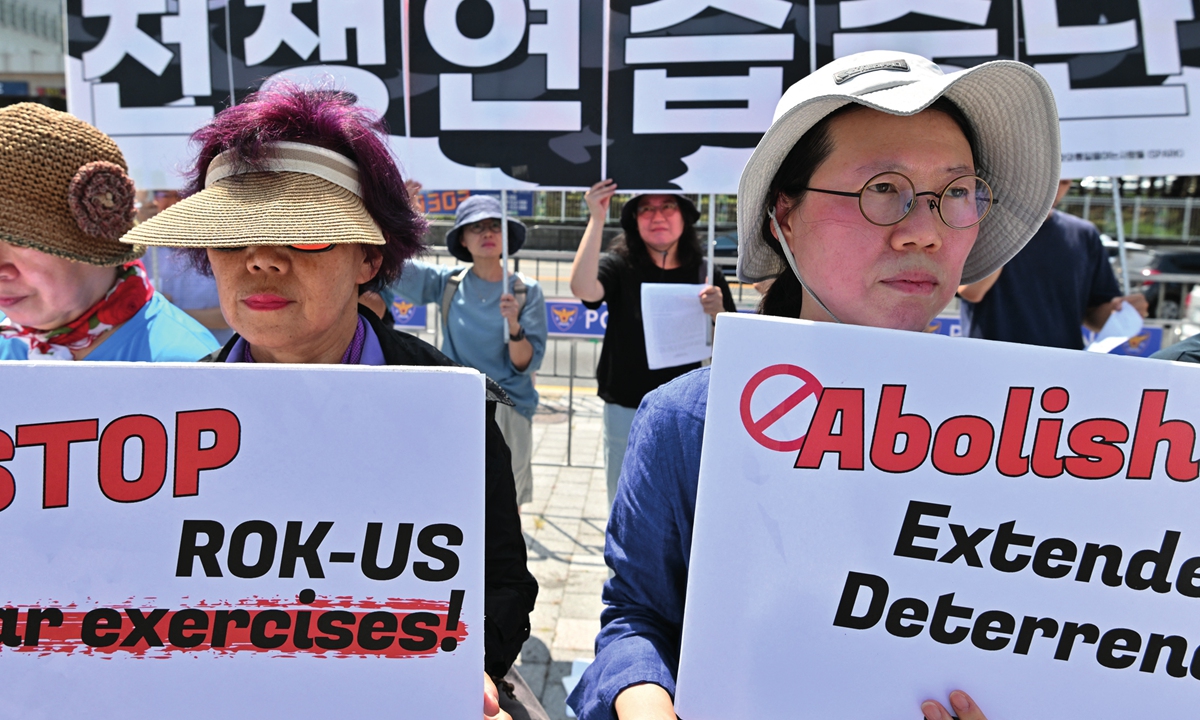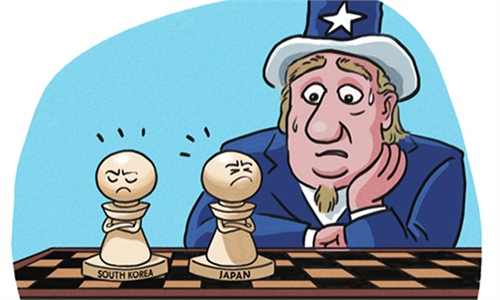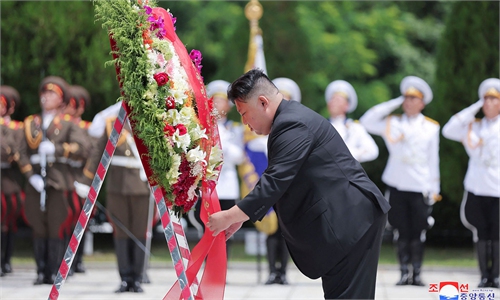
Anti-war activists hold a rally to protest against the US-South Korea Ulchi Freedom Shield joint military exercises, near the Presidential Office in Seoul on August 21, 2023. Photo: AFP
One day after South Korean president Yoon Suk-yeol returned from the Camp David trilateral summit, South Korea and the US kicked off a joint large-scale military exercise on Monday. Experts warned that the provocative move will bring unprecedented danger to peace on the Korean Peninsula as the drills are reportedly aimed at "bolstering their defense and preparedness against North Korea's evolving nuclear and missile threats."The Ulchi Freedom Shield exercise will last for 11 days until August 31, Nikkei Asia reported on Monday, and will include about 30 field training events based on an all-out war scenario. The number of drills this year will exceed those in previous joint military exercises.
South Korean President Yoon Suk-Yeol on Monday warned that North Korea "will fully mobilize all available means to achieve its goal in war and will be willing to use nuclear weapons," noting that starting this year, the Ulchi exercise will include a government-led drill on responding to a potential North Korean nuclear attack, the Yonhap News reported.
Some 580,000 officials from across the nation will participate in the exercise, according to the South Korean interior ministry.
In addition to the two countries' army, navy, air force and marine troopers, a space unit of US Forces Korea will also participate in the drills, which experts said is apparently aimed at North Korea's long-range ballistic missiles and military reconnaissance satellites.
This year's Ulchi drill is more aggressive and provocative both in rhetoric and actions, even hinting at a shift from defensive to offensive moves as Yoon has been instigated by the US from the Camp David summit, Lü Chao, an expert on Korean Peninsula issues with the Liaoning Academy of Social Sciences, told the Global Times on Monday.
These developments have greatly escalated tensions on the Korean Peninsula, leading to a critical military standoff with a constant risk of regional conflicts emerging, Lü warned.
"Given the increasing pressure from Washington and Seoul, Pyongyang could take stronger countermeasures, and in turn the continuous escalation could pose an unprecedented danger to the peace and stability of the region, making the situation the gravest since the signing of the Korean Armistice Agreement seven decades ago," the expert said.
As the joint drill began, North Korean top leader Kim Jong-un oversaw a strategic cruise missile test as he visited a naval unit on the east coast, state-run news agency KCNA reported on Monday, which was aimed at "verifying the combat function of the ship and the feature of its missile system," while improving the sailors' capability to carry out an attack mission in actual war.
Speaking on Monday, Yoon said the trilateral cooperation between South Korea, the US and Japan will only become stronger in the face of "provocations" from its northern neighbor.
The trilateral partnership will function as "powerful cooperation mechanisms promoting peace and prosperity in and outside the region," together with AUKUS and Quad, Yoon added.
Just as with AUKUS and Quad, the new trilateral circle is another tool deployed by the US to implement its broader Indo-Pacific strategy countering China, observers said.
Exerting more pressure on North Korea to coerce it into more intense forms of resistance actually serves US' strategy by creating chaos in the surrounding regions of China, particularly with a risk of nuclear war. Meanwhile, the US also aims to further tie South Korea closer to the US-Japan alliance through such a troublesome situation, they noted.
Slamming what experts dubbed a "mini-NATO in the making," Chinese Foreign Ministry spokesperson Wang Wenbin on Monday said "We see two trajectories in the Asia-Pacific today. One features efforts to advance solidarity, cooperation and economic integration. The other features attempts to stoke division and confrontation and revive the Cold War mentality."
"Regrettably, the US has been missing in the former and all examples in the latter are centered around Washington," Wang said.
The Asia-Pacific region is a promising land for peace and development. It should not be turned into a boxing ring for major power rivalry, still less a battlefield for a cold war or hot war, the spokesperson said, adding that attempts to stoke a new Cold War in the region will be firmly rejected by regional countries and peoples.


